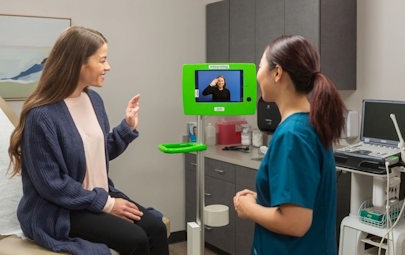
FAQ: Health Equity and Compliance in 2024 (Language Access)
This document was generated using questions and answers given during an online seminar sponsored by AMN Healthcare Language Services titled, “Health equity + compliance in 2024: How health systems can navigate proposed changes in the ACA's Section 1557.” The online seminar was hosted by Becker’s Hospital Review on November 2, 2023. This post was then reviewed and updated based on the final ruling of ACA Section 1557, released in April 2024.
Presenters
Carla Fogaren, R.N. - Principal Consultant, AMN Healthcare
Drew Stevens, J.D. - Of Counsel, Parker, Hudson, Rainer & Dobbs LLP
Q: What should we do when our interpreters are asked to sign consent forms as "witnesses"?
From my experience and from what our risk managers would advise, interpreters should only witness health care proxy’s. They should not “act” as witnesses for informed consents but rather sign that they were utilized as interpreters. They were not just witnessing they had an active role in helping to obtain viable consent.
Allowing an interpreter to serve as a witness to facts could present conflicts of interest that do not serve anyone’s best interest.
Q: How do we determine when we use an interpreter and when we can have family members interpret in situations ranging from taking food orders/teaching diet changes vs. asking about pain/comfort levels vs. explaining plan of care vs. to an obvious one of signing informed consent?
Anything clinical, complex, or medical must be done by a qualified medical interpreter.
Patients can refuse hospital-provided interpreters, however, best practice dictates that you utilize a qualified interpreter to inform the patient that qualified interpreters are available at no cost. If they still choose to utilize their family members, it would be prudent to explain that the conversation is medical and could be complicated. Further, explain that you prefer to use a qualified interpreter and that the family member can (and should) be involved as a support person.

If the patient still insists on utilizing their family, then you may attempt to retain the qualified interpreter to ensure that effective communication takes place. (Being able to retain an interpreter to monitor communication will be dependent on the language service provider's operational agreements and policies.)
Best practice is to document that the patient refuses the hospital-provided interpreter and chooses to utilize their family member instead. Document their name and relationship to the patient and the ID # or name of the interpreter utilized to inform the patient of their right to an interpreter.
There are so many reasons not to utilize family members.
- Impartiality and emotional involvement
- Lack of medical knowledge and terminology
- Potential issues with fluency in English
- Exposure to emotional and traumatizing information
- Risk of omitting essential information due to cultural or personal reasons
You put your license and the patient’s wellbeing at risk as you cannot validate that everything you said was properly conveyed, nor the patient’s words to you.
Q: Can we use staff members with dual-language capabilities to interpret?
Bilingual staff members should never be utilized as interpreters unless they have proof (such as certificates) of having the same level of training as qualified interpreters. If you are a bilingual staff person like a nurse, you must be tested to determine that you have the necessary clinical fluency in the other language. There should be a certificate that is issued once you pass the test. For NP, PA and MD’s this should be filed and managed in the medical staff office, for everyone else it should be filed in the employee’s HR file. Joint Commission and/or DNV will ask to see this certificate or proof. These bilingual employees are simply providing care in another language under the scope of their practice and license. They are NOT interpreting and should not. They should only provide direct care in another language.
Q: If the healthcare employee caring for an LEP (limited English proficiency) patient is fluent in that patient's language, is it required that the employee document themselves as an interpreter, or is "interpreter" only a 3rd party?
See response on bilingual staff above.
Q: We often see nursing homes not being compliant and are somewhat ignorant regarding statutes, regulations, etc. How can we better get the message of their responsibility out to them for compliance? I work as an advocate for the Deaf and this is a huge problem in my area.
I believe that the most efficient way is to have patients file complaints directly with the Office of Civil Rights and with whoever accredits the nursing home. Patients can also file complaints with the Joint Commision and even the state agencies.
Try to schedule a meeting with the patient ombudsman or patient advocate to help educate. Perhaps offer to do an Inservice on this topic to the staff.
Q: Do you have to list a person's name for the section 1557 coordinator or can you just list section 1557 coordinator without a specific name? Being such a large health system, it would be impossible to quickly update all signs if someone lives the org.
You do not have to list the name but need to list the following on policies, postings, and website the following:
“To contact a Section 1557 Coordinator/Officer please email [EMAIL ADDRESS] or call [PHONE NUMBER].”
You will need to be able to translate the emails and should be setting up a process by which the patient can access an interpreter when they call the line to facilitate meaningful access.
Q: Regarding Machine translation: is a human translator only review specifically for medical text or any text?
A qualified human translator should be utilized for all complex text. In healthcare that could be everything. Even websites for hospitals could be considered complex depending on the information or section.
Q: Many LEP patients decline interpreter services, and this is rarely discussed. Documentation of the offer and patients' decision to decline is key. We are required to provide, but the LEP patient is not always required to accept. Informed Consent for procedures and surgery, yes, but for regular health appointments, no, we can't force a patient to use an interpreter. Your thoughts?
Absolutely right, patients have the right to even refuse lifesaving care so they certainly can refuse interpreter services. The key is to utilize an interpreter to explain that we offer interpreters free of charge and document the name and ID # of the interpreter utilized; however, keep in mind that there are lots of reasons why family members should not be utilized. (See response above response above.) Also keep in mind that even if the patient asked for their family member to interpret you and your organization are ultimately responsible for all communication and everything that happens. Why put yourself at risk?
Q: Any word if accreditors such as DNV will start enforcing 1557 compliance? I find that in many cases, it is not enforced or even inquired about during surveys.
It is my understanding that DNV and Joint Commission will include any legal or statutory requirement in their survey. I think the Joint Commission has been more active with this; however, DNV will be doing so as well.
Q: Currently, are health organizations required to provide EMR Patient portals in different languages?
Yes, where necessary to provide meaningful access to LEP individuals. We recommend working with the EMR vendor to facilitate this.
Q: Is there a level of responsibility that Interpreter Services has to bear if a provider fails a language proficiency test and continues to provide care for their patients in that language without an interpreter?
The level of responsibility should be the same as any other staff person, when you see something say something. It is unsafe, so all hospitals have a system to file an incident report. These can be done anonymously and are non-punitive in nature. I would recommend that the supervisor of interpreter services speaks to the provider as a courtesy stating that they are not following policy and that they may be putting themselves at risk. If that does not work then it should be reported to their supervisor, the CMO, Risk Management and whoever else is necessary in your organization.
Q: If I'm a nurse, and I was tested for proficiency in Spanish, can I relay information for another's nurse's (who speaks only English) patient in Spanish? Or does the English-speaking nurse need to use interpreter?
You can provide your care directly under the scope of your license direct to the patient as you have been credentialed as a qualified bilingual staff (QBS) however the minute you “assist” your colleague you are essentially interpreting. In this case, because you have not been trained or deemed qualified for that, you would be putting yourself and your license at risk. You would be operating outside of your role. She needs to utilize an interpreter.
Q: Are hospitals required to provide a waiver document to decline interpreter services in the patient's preferred language or can the interpreter just translate the document and explain to the patient their language access options?
This is an interesting one. I utilized a waiver refusal form that was translated into the top languages of our hospital system. It really did not work well as it utilized complex legal language and made patients uncomfortable. I found that the best practice is to utilize an interpreter when and only when the patient somehow indicates that they want someone other than the appointed interpreter to interpret for them. You must document that intervention in the EMR along with the interpreter's name or ID # as well as the name and relationship of the person the patient chose to interpret for them.



